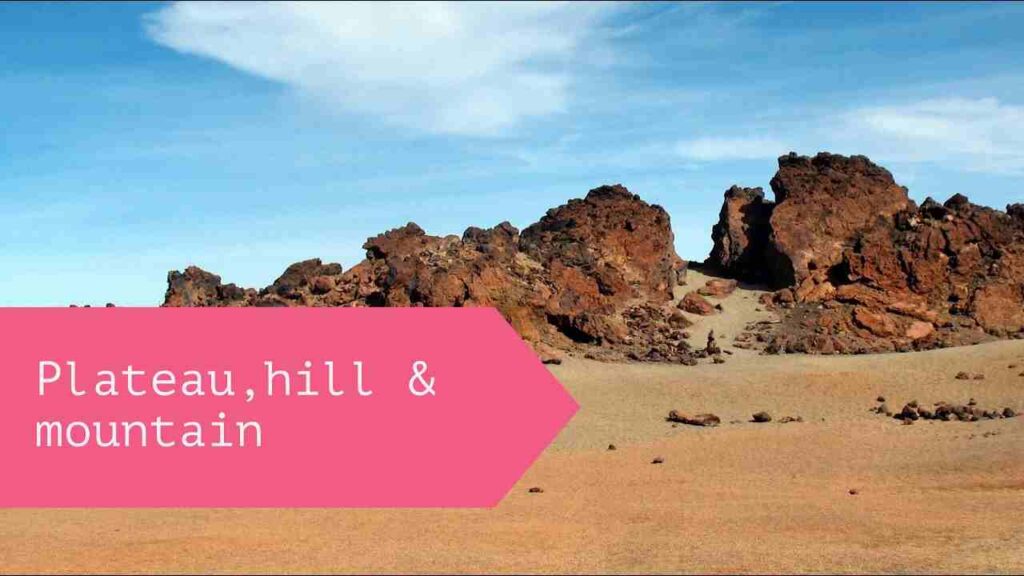
Understand what is the difference between a Mountain and a Plateau
Welcome to the fascinating world of geology! In this exploration, we delve into what is the difference between a mountain and a plateau, unraveling the unique characteristics that set these majestic landforms apart. Let’s embark on this enlightening journey together!
What is the 12 difference between a Mountain and a Plateau?
Ah, the majestic allure of nature’s wonders! Today, let us embark on a journey to explore the remarkable disparities between the enchanting mountains and the captivating plateaus. Brace yourself for an intriguing expedition into the contrasting features that set these geological formations apart. Prepare to be amazed, dear reader!
Elevation: Mountains tower majestically above the landscape, displaying their lofty summits and jagged peaks. In contrast, plateaus offer a level or gently sloping terrain that is elevated above the surrounding areas.
Formation: Mountains are typically created by tectonic forces, which occur when the Earth’s crustal plates collide or when there is volcanic activity, which pushes land upward. While extensive flatlands are produced as a result of processes like erosion, uplift, or volcanic activity, plateaus, on the other hand, are formed.
Shape: Mountains often resemble jagged peaks or ridges due to their more distinct and abrasive shape. In contrast, plateaus have a surface that is more regular and level and extend over a significant area.
Relief: Mountain relief is characterised by altitude changes and includes deep valleys, ravines, and gorges. Contrarily, plateaus exhibit a relatively level topography with little variation in height throughout their expanse.
Climate: As one climbs mountains, the air becomes cooler because of the higher altitude. As a result, they frequently contain a variety of climatic regions, from temperate forests to peaks covered in snow. However, plateaus typically have a more consistent climate throughout, displaying a variety of various weather patterns depending on their location.
Biodiversity: Mountains are renowned for their exceptional biodiversity because they are home to a variety of distinct ecosystems at various altitudes. Mountain ranges are frequently unmatched in their abundance of flora and fauna diversity. Despite being able to support a variety of plants, plateaus typically have less biodiversity in comparison.
Water Bodies: Mountains are renowned for their beautiful waterfalls, streams, and glacial lakes, which are frequently created by the melting of snow or rainwater. On the other hand, plateaus may have rivers or lakes, but they are typically less numerous than they are in mountainous areas.
Accessibility: Mountains are more difficult to reach and navigate due to their rocky nature. For exploration, they require specialised tools and abilities. Plateaus provide easier accessibility and navigation for travellers due to their comparatively flat terrain.
Economic Significance: Mountains have economic value because of their abundant mineral resources, which makes them crucial for mining operations. Their scenic beauty draws tourists and provides outdoor recreation options like skiing and hiking. Meanwhile, plateaus offer productive land for farming and occasionally serve as grazing areas for livestock.
Geological Age: Mountain ranges are frequently younger geologically than plateaus. Mountain-raising forces are relatively recent in Earth’s history. On the other hand, plateaus may be the remains of historic elevated regions that have undergone significant erosion over time.
Natural Hazards: Because of their steep slopes and unstable terrain, mountains are more vulnerable to natural hazards like avalanches, landslides, and rockfalls. Plateaus are less vulnerable to these dangers due to their generally flat topography.
Cultural Significance: Mountains have captured people’s attention throughout history and are frequently used as symbols of majesty, spirituality, and cultural significance. Despite being less revered in this regard, plateaus have their own cultural significance because some of them have historically hosted human settlements and advanced civilizations.
Thus, dear adventurer, armed with these differences, you can now embark on your next expedition with a deeper understanding of the contrasting splendors that mountains and plateaus hold. May you continue to marvel at the diverse tapestry of our planet’s magnificent landscapes!
Also Read: Explore 10 Key Difference between Acquired and Inherited traits